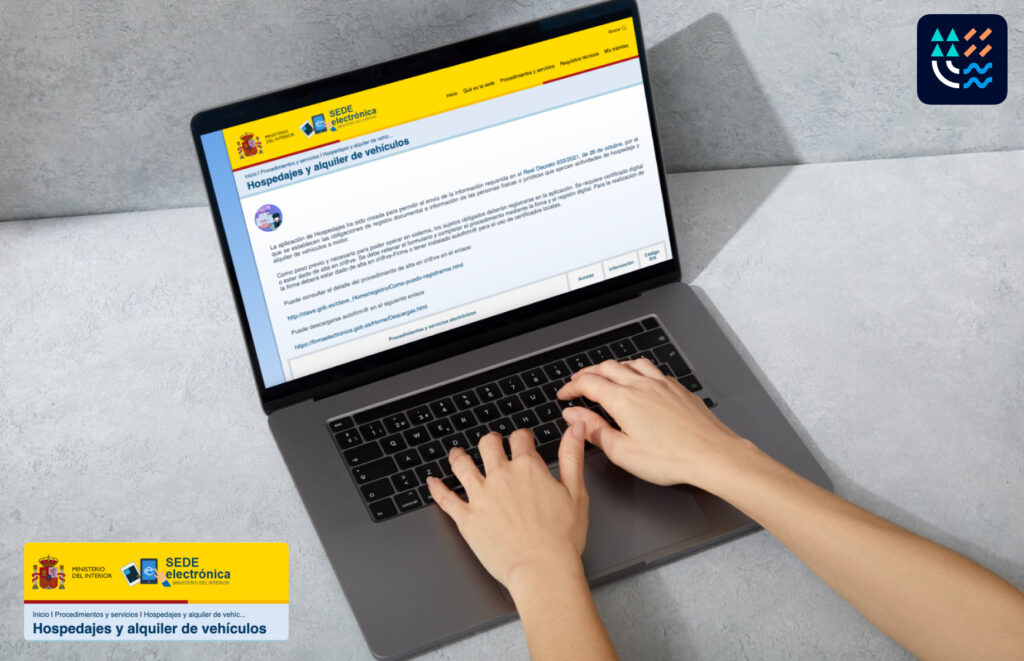If you own an accommodation in Spain you’re probably already aware of a new law published in Spain’s Official Gazette (BOE) that’s been generating quite a buzz. This is Royal Decree 933/2021, which regulates the documentary obligations for registering guests.
Decoding laws directly from the BOE can sometimes be tricky, so we want to make it as easy as possible for you to get a quick overview of everything you need to know about Spanish guest registration. If you’re unsure about what this law involves and how to adapt your hotel or accommodation to comply with the Spanish regulations, stick around—we’ll walk you through it all.
🟠 Update December 2024 – Spain tourist registration rules
- The final application date is confirmed as definitive: December 2, 2024.
(activate automatic subtitle translation into English)
1. Key details of Royal Decree 933/2021
1.1. Who does Royal Decree 933/2021 apply to?
This new guest registration regulation applies to any individuals or legal entities whose primary activity is providing accommodation. This includes hotels, apartments, hostels, guesthouses, campsites, and more.
Additionally, the decree extends to tourism operators that provide intermediary services between hospitality businesses, as well as digital platforms that facilitate these activities online.
1.2. Important deadlines in Royal Decree 933/2021
Here are the key dates for the implementation of this Royal Decree, as outlined in the BOE:
- Effective date: January 2, 2023
- Initial adaptation period: until June 2, 2023
- First extension: January 31, 2024
- Second extension: October 1, 2024.
- Latest update: adaptation period extended until December 2, 2024
1.3. When do I need to start complying with Royal Decree 933/2021?
The Decree has been in effect since January 2, 2023. Starting December 2, 2024, you’ll need to fully comply with the registration and communication requirements as described in this article and in Royal Decree 933/2021, as the adaptation period will end, and penalties may be imposed on properties that do not meet their obligations.

2. New communication platform: SES.Hospedajes
One of the most significant changes introduced by this new guest registration law is the update to the entity receiving the entry form data.
Previously, this information was sent to the Spanish Civil Guard through Hospederías or to the Police through WebPol.
Now, guest data must be submitted to the Ministry of Interior via the SES.Hospedajes platform.
Are you unsure about the new platform or how to automate the process of submitting guest data with this change? Our Guide to Guest Registration with SES.Hospedajes explains everything about the Ministry of Interior’s new application.
3. Changes in guest data collection
There are quite a few changes to be aware of when it comes to entry forms and guest data during the accommodation check-in process. Here are the key points:
- The number of data points to be collected has increased: the property will now need to gather 17 pieces of information per guest at check-in. Previously, only 9 pieces of data were required.
- The new data required doesn’t appear on the guest’s ID document, except for the address if it matches their usual residence.
- All guests over the age of 14 must sign the entry form.
- One piece of information required under the previous regulation, the ID document issuance date, is no longer needed.
3.1. Guest entry data required in 2025 (Royal Decree 933/2021)
1. First name
2. First surname
3. Second surname (if applies)
4. Gender
5. ID document number
6. Document reference number
7. Type of document (DNI, passport, TIE)
8. Nationality
9. Date of birth
10. – Full address (Place of usual residence)
11. – City (Place of usual residence)
12. – Country (Place of usual residence)
13. Landline phone number
14. Mobile phone number
15. Email address
16. Number of travelers
17. Relationship between travelers (if any of them is a minor)

4. Territorial scope of Royal Decree 933/2021
The obligations outlined in this new guest registration regulation apply to the entire Spanish territory; however, there are exceptions in two autonomous communities: Catalonia and the Basque Country.
Establishments located in these regions must continue submitting entry forms to the Mossos d’Esquadra or the Ertzaintza.
If your property is located in Catalonia or the Basque Country, we’ve prepared specific articles so you don’t miss anything:
5. Fines and violations under Royal Decree 933/2021
As we mentioned earlier, starting December 2, 2024, you could face a fine if you fail to comply with the guest registration obligations outlined in the Spanish Royal Decree 933/2021. But what types of violations are there, and what fines are associated with them? We’ll explain everything in this section.
5.1. Sanctions regime – Organic Law 4/2015
To determine fines based on the type of infractions committed, Organic Law 4/2015, or the Organic Law on Citizen Security Protection, will apply.
5.2. Types of infractions
Royal Decree 933/2021 specifies that the fines laid out in the citizen security law will apply to both minor and serious violations:
Minor infractions
Minor infractions are punishable by fines ranging from €100 to €600 and include:
- Irregularities or deficiencies in completing the registration information required by the decree.
- Submitting mandatory communications after the specified deadline.
Serious infractions
According to Organic Law 4/2015, serious infractions include:
- Lack of the required documentary records as outlined in Royal Decree 933/2021.
- Failure to submit the mandatory communications specified in the regulation.
These violations can result in fines ranging from €601 to €30,000, depending on the severity:
- Minimum severity: €601 to €10,400
- Medium severity: €10,401 to €20,200
- Maximum severity: €20,201 to €30,000
6. FAQs Royal Decree 933/2021 and Traveler Registration (new Spanish registration rules)
6.1. Is traveler registration mandatory?
Yes, traveler registration is mandatory for security reasons in accommodation properties. Under the new Royal Decree 933/2021, you are required to collect 17 pieces of data from your guests and submit them to the Ministry of Interior via the SES.Hospedajes platform.
6.2. How long can I continue sending data to Hospederías or WebPol?
Since Royal Decree 933/2021 came into effect, properties should have begun submitting entry forms through the new SES.Hospedajes platform. However, if you’re still sending data to Hospederías or WebPol while adjusting your operations, please note that this will no longer be allowed after December 2, 2024, or it will be considered a infraction subject to a fine.
6.3. Can the data collection process during check-in be automated to avoid long lines at reception?
Yes, of course! Some establishments have already automated these processes and digitized check-ins to streamline data collection.
With Civitfun’s online check-in, not only will you save time and speed up operations, but you also have access to easily configurable dynamic check-in forms to collect the legally required data.
6.4. When do entry forms need to be submitted to SES.Hospedajes?
According to Royal Decree 933/2021, entry forms must be submitted within 24 hours of:
- The reservation being made or the contract being formalized, or its cancellation if applicable.
- The start of the contracted services.
6.5. How can I automate the submission of entry forms under Royal Decree 933/2021?
There are already tools integrated with the SES.Hospedajes platform that allow automatic data submission, such as Civitfun’s Guest Registration. The submission is automated if all the fields are correctly completed, as the tool detects errors and issues alerts for any potential data issues.